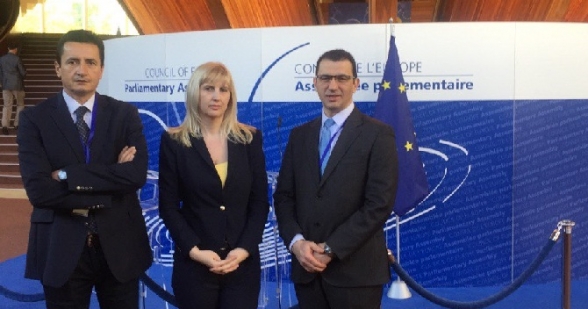The Parliamentary Assembly of the Council of Europe supported the Resolution on Mass Surveillance in which, among other things, it calls for strengthening of parliamentary and judicial control of intelligence services, collection and analysis of personal data without consent of the person concerned only on the basis of a previous court order, and provision of credible, effective protection for whistle-blowers exposing unlawful surveillance activities
Following the end of the discussion on budget and priorities of the Council of Europe and expenditures of the Parliamentary Assembly in the period from 2016 to 2017. The PACE adopted the Resolution and the Opinion in which it was highlighted that the wide reform process implemented by the Council of Europe in order to enable more effective dealing with the current challenges could be realised only with political and financial commitment of the member states. In that sense, Turkey’s decision to become a major contributor to the budget of the Council of Europe in 2016 was welcomed.
The Parliamentary Assembly of the Council of Europe was addressed by the King of the Belgians today, who called for the “establishment and preservation of a decent society“, expressing his regret at “too many situations in which men and women are not treated with dignity”. He highlighted that one of the most important tasks of Europe was to continue to build a culture in which decency and civility prevailed over indifference.
In the afternoon session, the topic was the humanitarian consequences of the actions of the terrorist group known as “Islamic State”. In the resolution which was adopted on this occasion, the PACE called for its member states to demonstrate solidarity and responsibility towards the refugees and undertake all necessary measures to prevent their citizens to go to the battlefield in Syria.
At today’s session, the judges of the European Court for Human Rights were elected in respect of Andorra, Austria, Finland, Ireland and Liechtenstein.
When answering the questions by the MPs, Secretary General of the Council of Europe Mr Thorbjørn Jagland especially referred to the Action Plan of the Council of Europe for Ukraine, aimed at providing support to the political and constitutional reforms in Ukraine, as well as the need for improvement of rescue operations at the sea, but also strengthening of economic, social and political situation in the Mediterranean countries.
During the day, the meetings of the Committee on Political Affairs and Democracy; the Committee on Migration, Refugees and Displaced Persons; the Committee on Social Affairs, Health and Sustainable Development; the Subcommittee on Human Rights; the Committee on Culture, Science, Education and Media; and the Committee on Rules of Procedure were held.
At the meeting of the Subcommittee on Human Rights, the List of Candidates for the election of a member of the European Committee for the Prevention of Torture and Inhuman or Degrading Treatment or Punishment (CPT) from Montenegro was considered.
On day three of the Spring Session, discussion will be held on consequences of the political and security situation in Ukraine, discrimination against transgender people in Europe, and legislation and practice of the removal of children from their families in Council of Europe member states.
Delegation of the Parliament of Montenegro at the Spring Session consists of: Mr Predrag Sekulić, Head of the Delegation, and Mr Goran Tuponja and Ms Snežana Jonica, members of the Delegation.
